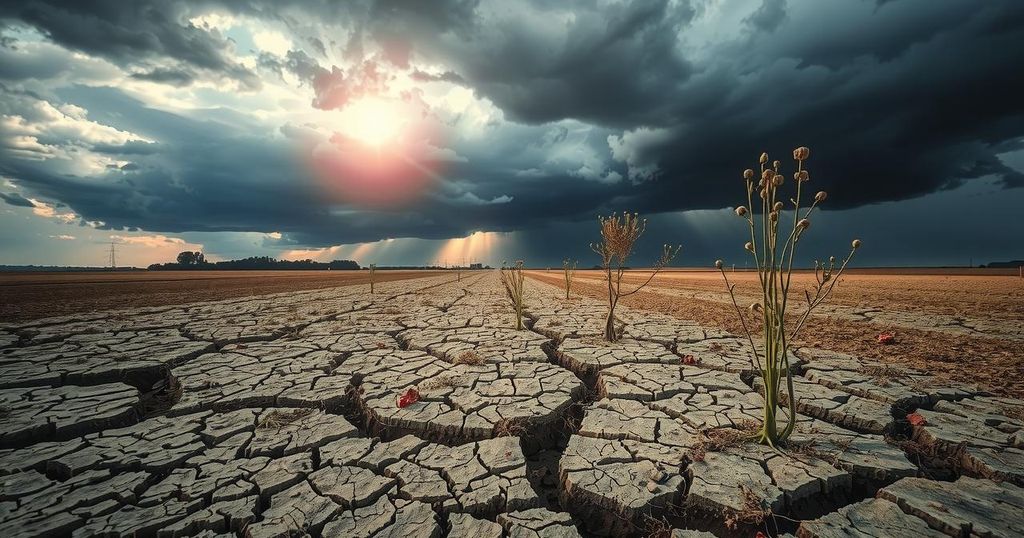Impacts of Extreme Weather on Global Crop Production and the Urgent Need for Adaptation Strategies

Extreme weather is wreaking havoc on global agriculture, leading to significant crop losses in various regions, including Africa, Asia, and South America. The IPCC warns that these events are becoming more frequent and severe, necessitating urgent adaptations in farming practices. An analysis by Carbon Brief highlights numerous instances of crop destruction linked to climate change, emphasizing the need for improved resilience and support systems for farmers.
Recent reports indicate that extreme weather conditions are causing significant destruction to crops globally, evidenced by occurrences of floods destroying corn in Tanzania, droughts crippling coffee production in Vietnam, and heat damaging Cambodian Kampot pepper. A comprehensive analysis conducted by Carbon Brief covers 100 instances of crop damage attributed to these extreme phenomena for the years 2023-24, primarily sourced from national and international media as well as data from the UN Food and Agriculture Organization.
The Intergovernmental Panel on Climate Change (IPCC) has documented an increase in “sudden food production losses” attributed to extreme weather events since the mid-20th century. There is a growing consensus among experts that these recurring events could render many existing food production areas unsuitable for agriculture. Immediate impacts on agriculture include reduced yields and the potential devastation of entire harvests, as illustrated by the aftermath of a devastating typhoon in the Philippines in 2012.
Changing climatic conditions have driven agricultural practices to adapt, as evidenced by higher altitude apple cultivation in Nepal due to declining crops at once-favorable elevations. Experts note the multifaceted challenges posed by climate change, political volatility, and global trade disruptions on food production systems. It is imperative to build systemic resilience in global food systems to withstand these compounded risks.
Carbon Brief’s analysis reveals extensive crop damage due to extreme weather, highlighting diverse agricultural products that have been affected. The ongoing climate crisis exacerbates these risks, propelling unpredictability in food production and increasing overall vulnerability. Attribution studies illustrate how events such as heavy floods in Brazil have been intensified by climate change, underscoring the urgent need for enhanced adaptation strategies.
The El Niño phenomenon has further complicated the agricultural landscape, leading to severe drought conditions in Southern Africa that devastated significant maize outputs in Zimbabwe. Concurrently, it has contributed to widespread wildfires in Chile, impacting vineyards and soybean production in Argentina. These interactions underline the broader implications of climate change on both crops and livestock, with considerable livestock mortality recorded in Mongolia’s extreme winter conditions.
There are potential positive outcomes for specific crops in warmer climates; however, the overarching projection remains alarming. The IPCC predicts large negative consequences for global food systems if temperatures rise by 2C by the century’s end, with a higher likelihood of simultaneous crop failures. Adaptation practices, ranging from sustainable management techniques to integrating local knowledge, are necessary yet frequently hindered by financial constraints.
Efforts must focus on creating resilient agricultural systems to mitigate the impacts of climate-induced extremes. Experts advocate for enhancing adaptive capacities, particularly among small-scale farmers, who often lack the resources to cope with extreme weather shocks effectively. While existing support mechanisms such as crop insurance can be beneficial, their accessibility and affordability are becoming increasingly problematic.
Ultimately, researchers emphasize the importance of aligning agricultural innovation with real-world applications and equitable access to drought-resistant technologies. Proactive adaptation strategies, investment in resilient practices, and informed policymaking will be crucial for navigating the future challenges posed by climate change in agriculture.
Extreme weather events are increasingly threatening global crop production, with significant losses reported across diverse regions. The complex interplay of climate change, geopolitical factors, and economic conditions exacerbates these risks, highlighting the urgent need for resilient agricultural practices. Adaptation efforts, particularly for vulnerable small-scale farmers, must be prioritized to ensure food security amidst escalating climate challenges. Embracing innovative agricultural techniques and enhancing accessibility to adaptive technologies will be vital in addressing future climate impacts.
Original Source: interactive.carbonbrief.org






